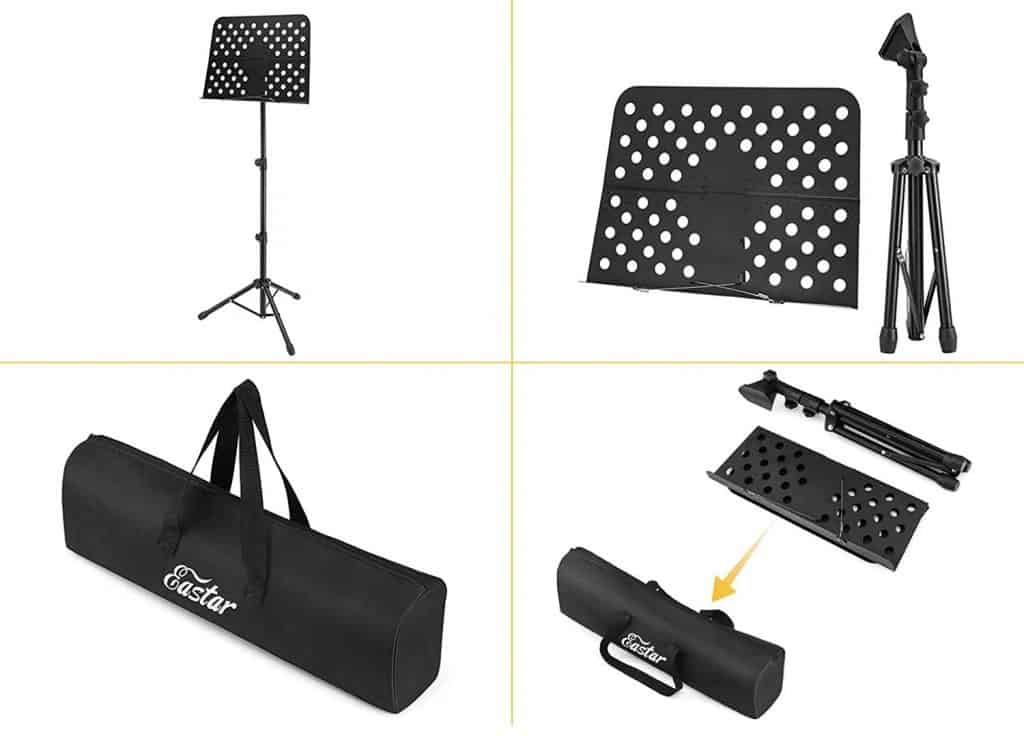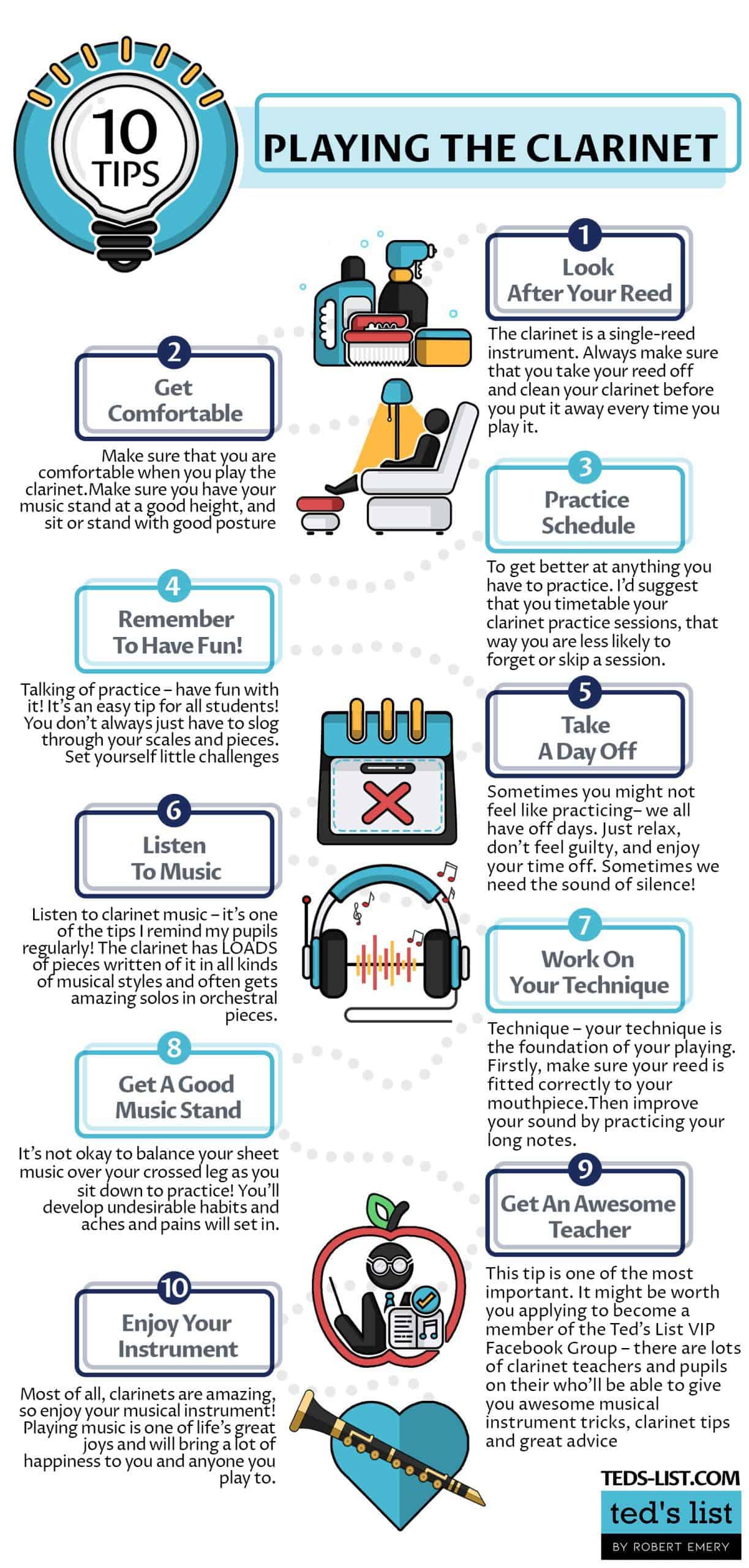Dear Clarinet player,
First of all, CONGRATULATIONS on playing the clarinet and choosing the best instrument! Here is a list of the top 10 tips for playing, practicing, and looking after your clarinet.

Look after your reed
The clarinet is a single-reed instrument. Always make sure that you take your reed off and clean your clarinet before you put it away every time you play it. One of my pupils forgot to do this and their reed actually went mouldy! YUCK! A clean clarinet is a happy clarinet. Buying reeds can add up – so look after them. An easy, but crucial tip!
Getting the correct reed for your mouthpiece is crucial. The reeds that we recommend are these by D’Addario. They are used by professional players all over the world, and I think they’re great! And remember to always keep a spare pack of reeds handy – without reeds, you’re no longer a clarinetist!
Get comfortable
Make sure that you are comfortable when you play the clarinet. This doesn’t mean curling up in your favorite armchair or lying on your bed! Make sure you have your music stand at a good height, and sit or stand with good posture – try not to slouch!
As a bonus, if you’re comfortable, you’ll produce a nicer sound.
Practice Schedule
To get better at anything you have to practice. It’s one of the most obvious tips for all clarinetists from beginner through to professional! We all have super busy lives and so I’d suggest that you timetable your clarinet practice sessions, that way you are less likely to forget or skip a session. The old saying practice makes perfect really is true! Some of the elements you should concentrate on are:
- Improving your sound
- Improving your embouchure
- Smooth your air stream
- Work on your breathing
It’s also worth practicing positioning your reed in your mouthpiece, doing regular exercises to measure your air flow, and practice your finger techniques.
Remember to have fun!
Talking of practice – have fun with it! It’s an easy tip for all student musicians! You don’t always just have to slog through your scales and pieces (although who honestly likes scales……?). Set yourself little challenges:
- Can you play a slurred passage tongued?
- Can you play a whole scale in one breath?
- How long can you hold your favorite note for?
After all – time flies when you are having fun!
Take a day off
Sometimes you might not feel like practicing – we all have off days. One of my teachers gave me the best tip for this. He said, “just get the clarinet out of the box and I bet you’ll want to play it”.
Clarinets are sneaky instruments – as soon as they are out of the case and put together they are irresistible! But if you really do feel like taking a day off, don’t even think about how to hold the clarinet – just relax, don’t feel guilty, and enjoy your time off. Sometimes we need the sound of silence!
Listen to music
Listen to clarinet music – it’s one of the tips I remind my pupils regularly! The clarinet has LOADS of pieces written of it in all kinds of musical styles and often gets amazing solos in orchestral pieces. Clarinets are everywhere on YouTube – just type in ‘Clarinet solo.
It’s really fun to be able to spot the clarinet in pieces of music or just have a piece in mind that you would like to learn to play one day.
Work on your technique
Technique – your technique is the foundation of your playing. Imagine it like a house – if it didn’t have foundations it would be VERY wobbly.
There are a few things you can do to improve your technique – firstly, make sure your reed is fitted correctly to your mouthpiece. Then improve your sound by practicing your long notes (builds up good strong lungs by having more air flowing through), scales & arpeggios (helps your fingers become lovely and flexible and helps you to recognize scaly patterns in pieces), finger wiggles – literally wiggling between notes (makes your fingers work well together on the keys, even those awkward ones which don’t want to behave).
You could also do some mouth exercises, helping strengthen your lip…
If you start and end a practice session with these then you will have strong and very non-wobbly foundations and become a better clarinetist in no time.
Get A Good Music Stand
It’s not okay to balance your sheet music over your crossed leg as you sit down to practice! You’ll develop undesirable habits and aches and pains will set in, you won’t produce the best sound and all of these tips will be worthless.
Using a foldable stand is okay – especially in regards to having one for when you need to bring your own personal stand to a gig, recording session, or music lesson. In this case, we suggest this collapsible stand.
For when you’re playing at home though, we recommend this kind of strong, tough, non-foldable music stand…
Of course, it costs a little bit more initially, but it will be such a beneficial investment, and many good music stands can last as long as ten years. For comparison, a poorly produced one can break in a few weeks.
Overall, this is actually the best model of music stand I’ve ever tried. It’s dependable, has got loads of amazing testimonials, and I even have one at home which I love…
Get An Awesome Teacher
This tip is one of the most important: A good teacher is one of the most precious things in the world. But herein lies the issue – there are many teachers to choose from, just how do you pick one?
Search for simple factors:
- Do you like the way they describe things to you?
- Do they really excite you?
- Do they offer you straightforward recommendations that can make the world of difference to your playing?
Providing your answer is yes to the majority or all of these questions, then you’ve got an awesome teacher that is definitely working for you and your individual situation.
However, are you still trying to find that elusive teacher? My initial ‘port of call’ would be to obtain personal referrals from your local area. Perform some research on Facebook and Linkedin to see who your local teachers are, and what type of support they have from their students.
If you have trouble finding a teacher, it might be worth you applying to become a member of the Ted’s List VIP Facebook Group – there are lots of clarinet teachers and pupils on their who’ll be able to give you awesome musical instrument tricks, clarinet tips and great advice.
Seek and yea shall find!
Enjoy your instrument
Most of all, clarinets are amazing, so enjoy your musical instrument! Playing music is one of life’s great joys and will bring a lot of happiness to you and anyone you play to. Make sure that you play something you really love every time you practice and maybe even sometimes treat your family and friends to a mini-concert.
“Think big. Don’t listen to only clarinet music, please! Become a musician who plays the clarinet well. That means hours and hours of drills, etudes and practising. But always put MUSIC – expression, phrasing, nuance, colour, inflection – as your number one priority.”
– Alan Kay, Juilliard
Playing the clarinet - top 10 tips
Summary
The clarinet is one of the best instruments to play. Yes, you have to deal with reeds and a mouthpiece. Yes, it can be tricky for beginners to sort out their lip placement, and their airflow.
But becoming a clarinetist is more than that.
It’s about playing in an orchestra, or band – it’s about playing solo clarinet, or even jazz. It’s an incredibly versatile instrument, so as a beginner, keep practicing to get over the hurdle of ‘novice’, and you won’t regret it!
Do you want to share this infographic on your site? Use this code...
FAQ's
The most popular clarinet plays in the key of Bb (B Flat). The clarinet is a single-reed instrument (meaning literally, it only has one reed!).
To improve the tone quality of your clarinet, you need to work on your sound. Firstly, your sound and tone are linked with the quality of the instrument you have. Your embouchure also has an effect, so if you have a decent quality instrument, turn to improving your technique.
You should practice the clarinet each day for the length of time you can focus properly. If that’s 10 minutes – that’s fine. If it’s 30 minutes, then it’s great. But remember, a shorter practice session where you are fully concentrating on how to play the clarinet is much better than a long, unfocused session.
One of the reasons you are producing too much spit is because your embouchure isn’t quite right. If you work on your embouchure and improve it, you’ll find that you stop spitting when playing the clarinet.














I play the flute, can these tips apply to all woodwind instruments or just the clarinet?
Some of them are for any instrument. But we do have a dedicated article for flutes here…